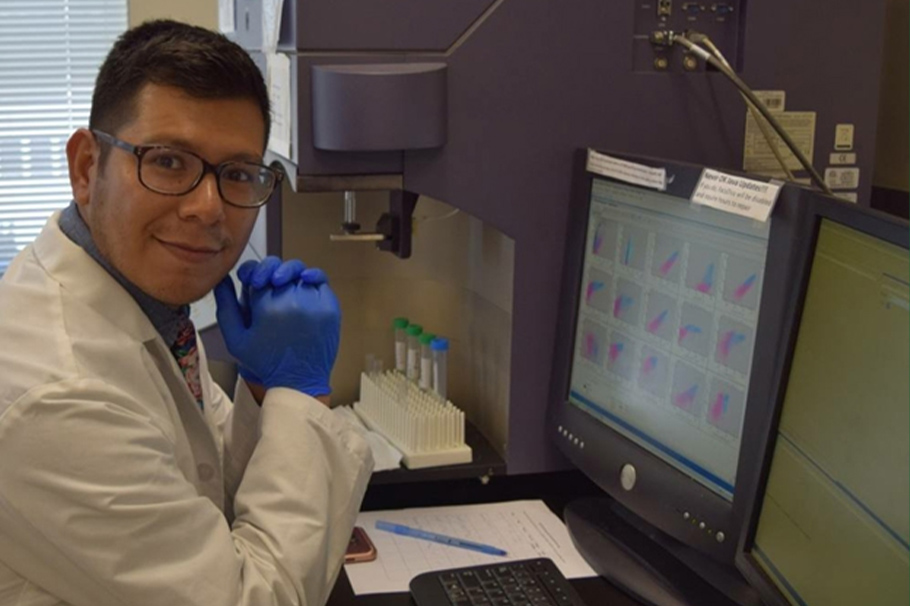Dr. Eliseo Castillo earned a Bachelor of Science in Biology with a minor in chemistry in 2003 and a Master of Science in Chemistry in 2005 from Eastern New Mexico University. He received a Ph.D. in Immunology from the University of Texas MD Anderson Cancer Center in 2010.
Dr. Castillo, who serves as an assistant professor in the Division of Gastroenterology and Hepatology in the Department of Internal Medicine at the University of New Mexico School of Medicine, discusses his Eastern experience.
Why did you choose to attend ENMU?
I enjoyed a campus visit while I was a student attending the New Mexico Junior College. I liked what ENMU had to offer, and I eventually transferred to ENMU after my freshman year.
How did you choose your field of study?
As an undergraduate, I was undecided on my major; however, after a few lectures in the General Biology course discussing cell and molecular biology, I was interested in taking microbiology the following semester. This curiosity eventually resulted in me majoring in biology with an emphasis in microbiology. I eventually worked in a biochemistry lab as an undergraduate researcher, which led me to get my MS in Chemistry.
Which activities were you involved in at Eastern?
I worked in the Department of Physical Sciences doing undergraduate research in a biochemistry lab. It started off with me just doing dishes and cleaning up around the lab, but I was always asking the graduate students, "What is it that you are doing?," "Can I watch you set that up?," "Can I help set that up?," and I kept asking the professor to let me start my own research project. Eventually, the professor gave me the opportunity to start my own project.
Academic honors?
- • Graduate Fellowship, January 2004 – July 2005, NIH New Mexico Bridges
- • Graduate Fellowship, January 2004 – July 2005, NSF New Mexico Alliance Graduate Education and Professoriate.
- • Undergraduate Research Assistantship, September 2002 – December 2003, NSF New Mexico Alliance Minority Participation.
- • Undergraduate Research Assistantship, January 2001 – May 2001, Western Alliance to Expand Student Opportunities.
Discuss your experience at ENMU.
Since I majored in biology and chemistry from the Department of Biology and Department of Physical Sciences, I had the opportunity to work with professors from both departments – Drs. Varela, Cho and Liu in biology and Drs. Finley, Hilliard, Long and Yan in chemistry. They were all great teachers and quite encouraging for a young scientist.
Since my undergraduate minor was in chemistry, I had taken several of the upper-division chemistry classes, which prohibited me from taking the same courses as a graduate chemistry student. Therefore, I took Dr. Varela's immunology course while getting my master's degree in chemistry and became completely fascinated with this subject. As you can see, I eventually pursued my Ph.D. in Immunology.
What inspired you to take on your current position at the University of New Mexico?
There are numerous reasons, including my own scientific questions and research in immunology, that I hope could prove beneficial for various diseases. This is my way to give back to the community – so helping in health and medicine.
The lack of diversity and representation in the sciences – hopefully, I can serve as a visual foundation for underrepresented students who have an interest in STEM fields. I am a first-generation college graduate, and I started my college education at a junior college.
Mentoring and training younger scientists and the continuous pursuit of knowledge that goes with science.
What are your job duties?
I am the principal investigator of an immunology research lab mentoring and working with various trainees (undergraduate and graduate students, medical students, medical residents and fellows). I lecture for the graduate and medical school and write grants and research articles.
Tell us about your research.
My lab works on understanding how the immune system functions in the gastrointestinal tract in various diseases, including inflammatory bowel disease and metabolic syndrome.
What do you enjoy most about your job?
The discoveries and successes made by the young trainees.
What advice would you give to a student interested in working in your career field?
Everyone's journey is different, but I always tried to remember I was investing in my future, and this included my kids, siblings, nieces, nephews and others like me, especially those who might be a first-generation, underrepresented college student. As a student, I sought out opportunities to acquire knowledge about science and to talk to individuals who pursued a career in science. I tried to find local and out-of-state opportunities to do and present my research. Just a heads up, you may have to knock on numerous doors but be proactive.
I would also suggest STEM students seek out diverse mentors as well as network to learn about all the opportunities science offers. Besides teaching and research, scientists have careers in policy, patent law, communication, marketing and business, science liaisons, FDA/reviewer/inspectors and more.
I continue to pursue opportunities to do, hear and talk science. While doing science, I try to take calculated risks and embrace failure, but I try not to lose sight of my enthusiasm for science and keep pushing forward. Lastly, I also try to maintain a healthy work-life balance, so make time to enjoy life away from the bench.



